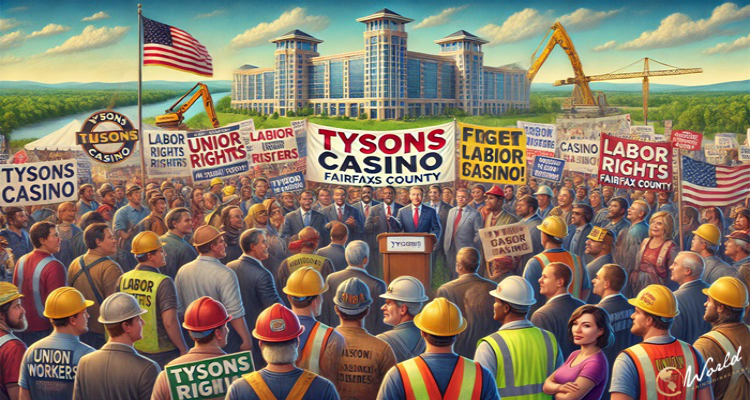The proposal to introduce a casino in Fairfax County, Virginia, has once again ignited a fervent debate among local residents, labor unions, and lawmakers. As the prospect of introducing gambling facilities in Tysons gains traction, the community’s response has been sharply divided.
Tysons set for 4-million-square-foot development including casino:
A large-scale development project could include a significant casino component. This proposed 4-million-square-foot project would transform a major area in Fairfax County and aims to deliver a blend of commercial, residential, and entertainment spaces.
At the heart of the plan is a 200,000-square-foot casino, projected to occupy a small portion of the overall space. Alongside the casino, the development would feature a hotel, performing arts venue, retail outlets, restaurants, and workforce housing. These elements aim to diversify Tysons’ offerings, adding more entertainment and housing opportunities.
While the “View at Tysons” project is still in its early planning stages, details about its exact location and timeline have yet to be finalized. Melanie McKee, a spokesperson for Comstock Companies, the developer leading the project, confirmed that no specific site within Tysons has been selected for the development. The project has not yet reached the land use approval stage, which will ultimately determine its final location and detailed plans.
Unions rally in support amid opposition:
Several labor unions have voiced strong support for the potential casino and entertainment district. The Fairfax County Jobs Coalition, including the Northern Virginia AFL-CIO and other labor groups, has planned a rally to coincide with a forthcoming Board of Supervisors meeting. They argue the development will bring substantial employment opportunities and boost local wages through project labor agreements (PLAs).
As reported by FFXnow, Greg Akerman, president of the D.C. area’s Building Trades Unions, emphasized the benefits for local workers, stating, “The developers have committed to implementing project labor agreements (PLA) guaranteeing ‘paid family-sustaining wages,’ apprenticeship programs, and other conditions for workers at the future entertainment complex.”
Conversely, a group under the banner of the No Fairfax Casino Coalition, comprising mainly homeowners and citizen associations, remains staunchly opposed. They argue that the casino would bring more harm than good, detracting from the community’s character and potentially leading to increased social issues.
Virginia Diamond, president of the NoVA Labor Federation, AFL-CIO, highlighted the potential for the project to uplift local economic standards: “There are union agreements in place that provide a fair process for thousands of workers to decide on permanent union jobs that would dramatically raise living standards for low-income workers in our community,” she said.
The journey toward casino authorization has been rocky. Initial bills introduced by state Sen. Dave Marsden and Del. Wren Williams faced early withdrawal amid concerns they were rushed. Despite this, interest from developers like Comstock persisted, focusing on a mixed-use development strategy tied to Tysons’ proximity to key infrastructure like the Silver Line Metro and regional shopping centers.
However, the latest legislative efforts have stalled. The Virginia Senate Finance and Appropriations Committee has decided to delay consideration of new casino legislation until 2025. This move came after significant community pushback, including a well-attended town hall meeting where local opposition was vocal. Sen. Jennifer Boysko, representing parts of northern Fairfax including Reston and McLean, has been a critical voice, arguing that the local community does not support the casino initiative.
Economic arguments for and against the casino:
Supporters of the casino, including Sen. Marsden, argue that it could significantly boost Fairfax County’s tax revenues, which have suffered post-pandemic. Proponents suggest the casino could diversify and strengthen the local economy by attracting tourists and providing a new source of entertainment. The Fairfax County Jobs Coalition cites an independent study suggesting the project could generate $140 million in additional commercial tax revenue.
Opponents, however, question these economic benefits, expressing concerns over potential increases in local taxes, such as a proposed meals tax, to offset any shortfalls. They fear that the negative aspects of gambling, such as increased traffic and potential social issues, could outweigh any financial gains.
With the legislation now postponed, both sides of the debate are preparing for a continued battle over the future of gambling in Fairfax County. The delay allows more time for community input and for lawmakers to consider the broader implications of introducing large-scale gambling to a suburban area near the nation’s capital.
The discussion touches on larger issues of local versus state control, the economic revitalization of post-pandemic commercial spaces, and the ethical considerations of gambling. As 2025 approaches, the dialogue is expected to intensify, with potential referendums and further legislative debates on the horizon.



